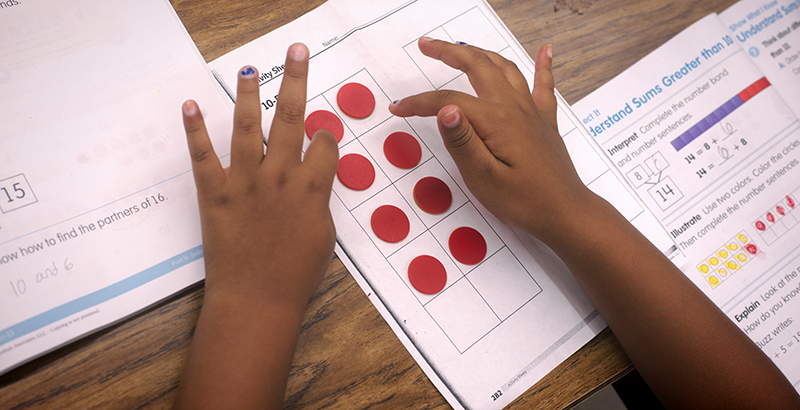Commentary: A Mom Wonders — I Never Enjoyed Math, but My Kids Love It. When Did Doing Math Become Fun?

There are things you come to expect to hear when you pick your kids up from school. These include “I’m hungry” or “I’m thirsty.” My favorite is “Did you charge the iPad?” But on the first day of school last year, I heard, “Mom, will you give us a math problem to solve, and can you make it hard?” I was taken aback. It made me wonder: When did math become fun?
I started with what I thought were grade-appropriate questions. My second- and third-graders quickly responded, “Mom, That’s too easy. Ask one that is harder.” What amazed me even more than the fact that they kept coming up with the right answers was how they articulately explained what method they used to get those answers. It really demonstrated how much they had learned and made me think about the differences between how they are being taught math and how I was taught.
My son Joshua’s second-grade teacher promised the kids on that first day of school in September that by the end of the school year, they would think math is fun. Joshua is proud to say she was right. I can’t remember one math teacher ever challenging me to find the fun in math. When I was in school, math was scary. When I was in third grade, we had to get in two lines and try to be the first to call out the answer to multiplication facts. The only problem was, I wasn’t very good at memorizing times tables. I can’t say I ever found much fun in writing out times tables 10 times each, either. Even subtraction was hard to make sense of, in that for a while, it didn’t really click why I had to put a slash through the number in the 10’s place and bring it over to the 1’s place.
Fast-forward to today. When my kids came home with two- and three-digit subtraction problems, they took out Legos to help. They used large Legos for 100’s, medium Legos for 10’s, and small Legos for 1’s. I watched as they turned a medium Lego into 10 small Legos and brought it over to the 1’s pile. It was clear they truly understood what “taking from” the 10’s meant. Their grasp of place value is solid, and their overall conceptual understanding of math is so much deeper than mine was at their age.
Kids today are also doing so much more than I was at their age. My second-grader confidently breaks down fractions, and my third-grader can easily find the perimeter of a shape.
I’m grateful that my kids’ teachers have embraced today’s new approach to teaching math, in which concepts are really explored and every child is challenged. Some parents in our community, at least initially, were less enthusiastic about the changes. I heard complaints like “It’s too many steps” or “It’s too complicated.” And, of course, “It’s not how we did it.”
Sure, there have been nights when homework directions confused me. My kids would try to tell me how to do something, and I wouldn’t always trust what they were saying. But the curriculum our school uses has parent tip sheets online, and when I checked, I found that the kids were usually right.
Because I wanted to learn as they were learning, I wasn’t thrilled about a new no-homework policy our school tried out this past year. I was worried that if they went a whole year doing math only in class, I would be behind and wouldn’t be able to help if homework comes back next year.
Luckily, I have a daughter who loves to play school. My memories of playing school didn’t involve using mathematical strategies like number bonds, which are used to help understand part-whole relationships. But that’s what my daughter, Sydney, now likes to do for fun. When Sydney grades my “tests,” she’ll ask me questions about how I got my answer to make sure I truly understand the meaning behind the math.
It is a gift to see both of my children so confident in math. With every new school year, I am repeatedly impressed with what they are learning. Yes, they are being challenged, but they are also proving that they are up for the challenge. I look forward to many more years of doing math problems on car rides.
Tally Bernard is the mother of two students at J. Wallace James Elementary School in Scott, Louisiana, and a member of the school’s Parent Action Committee and booster club. The school, part of the Lafayette Parish School System, uses Eureka Math.
Get stories like these delivered straight to your inbox. Sign up for The 74 Newsletter

;)